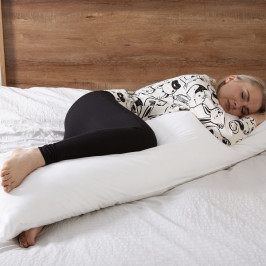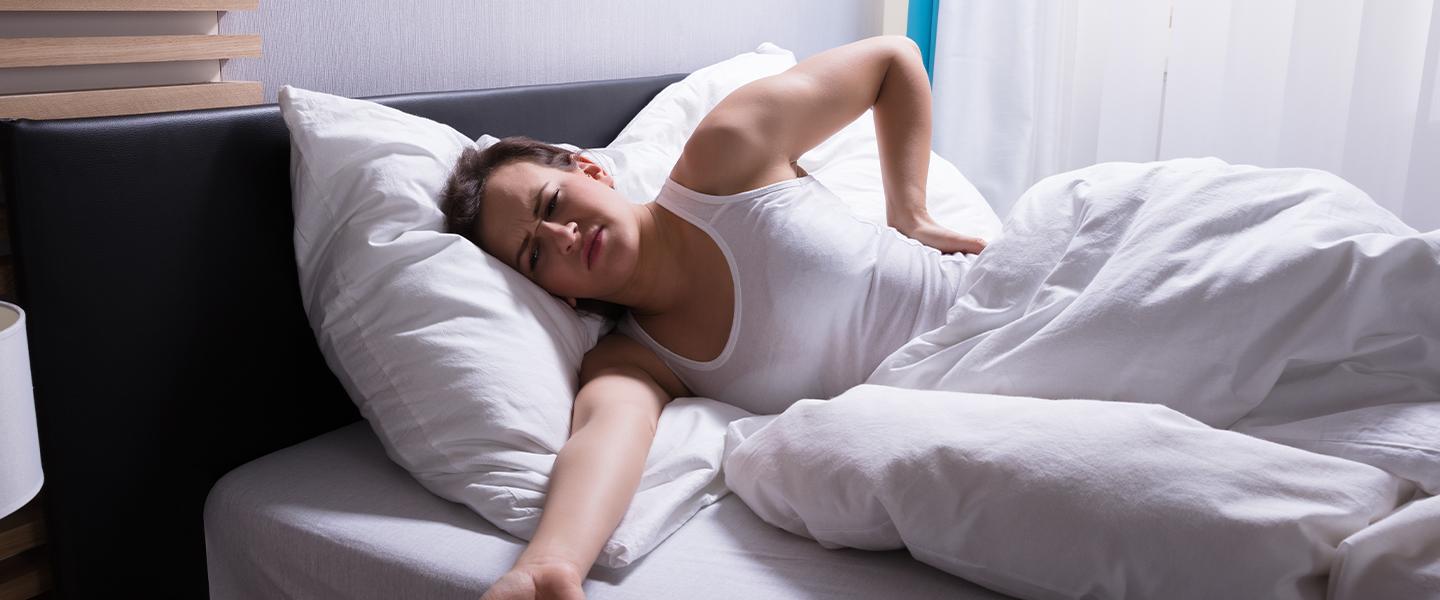How To Sleep With Lower Back Pain
By now, we all know the benefits of a good night's sleep, either through practice and repetition or studies from throughout the years.
Many are familiar with the feeling of waking up to spend the day sluggish, foggy and unmotivated, and strive to go to sleep every night to wake up on the "right side of the bed".
One contributing factor to a bad night's sleep for many people across the world is lower back pain at night.
Here, we will be taking a closer look at how lower back pain can affect sleep, the different types of pain encountered, and some top tips, including having the right pillows, to help you tackle the problem head-on on your quest for a restful night's sleep.
How can lower back pain affect sleep?
Some people find it easier than others to get a good night's sleep, but lower back pain is one of those annoying things that can hinder a person's rest. First, you can try to mitigate any pain by getting the right bedding; look at our guide to the best body pillows for back support for more information.
Here are some of the ways lower back pain can affect a person’s sleep so that you know what to look out for
- Pain
The most obvious way lower back pain affects sleep is by causing discomfort and pain. When you lie down, the pressure on your lower back can intensify the pain, making it difficult to find a comfortable sleeping position and drift off to sleep.
- Sleep disturbances
Lower back pain can be sensitive, and any little movement can provoke it. This can lead to frequent awakenings during the night, which interrupts your sleep cycle and prevents you from getting a proper, deep sleep.
- Anxiety and stress
Chronic lower back pain can lead to anxiety and stress, which can further disrupt your sleep as your mind will stay active throughout the night. The anticipation of pain can create a state of heightened alertness, making it challenging to relax.
- Muscle tension
Lower back pain often leads to muscle tension, especially in the lower back and surrounding areas. This tension can make it harder to relax and fall asleep.
- Sleep position changes
To find a more comfortable position for your ailment, you may shift around frequently. This will prevent you from reaching the deeper stages of sleep and reduce some of the benefits in the process.
- Fatigue
Poor sleep due to lower back pain can lead to daytime fatigue, reduced concentration, and decreased overall quality of life. Sleep is a crucial part of being human, and you have to do it right!
- Mood changes
Sleep disturbances caused by lower back pain can affect the brain, too. Poor sleep has been shown to lead to mood changes, including irritability, frustration, and even depression.
Different types of lower back pain that might affect sleep
When we talk about lower back pain, there are a few different types that can crop up, with different sensations and different ways of tackling it.
Here are some of the most common examples:
- Muscular pain: This is the most common type of lower back pain and can result from muscle strain, overuse and tension.
- Tendon and ligament pain: These pains can be caused by overstretching or tearing of the ligaments. It'll cause discomfort in the night if the injury is agitated.
- Discogenic pain: This is an issue with the spinal disks, which can degenerate, causing pressure on the nerves around the lower back.
- Facet joint pain: Facet joints are small joints between the invertebrae in the spine. These can sometimes inflame, causing pain at night.
If you suffer from any of the above, it might be worth investing in a new pillow or protective bedding like a mattress topper to help enhance your quality of sleep.
Top tips for sleeping with lower back pain
Now we've covered some of the difficulties of living with lower back pain, let’s take a look at some guidance. Here are 7 top tips for sleeping with lower back pain.
It is important to note this is not qualified medical advice. Any persistent back pain issues should be looked at by a professional as soon as possible.
Tip 1: Think about sleeping positions
People often underestimate the power of sleeping positions, but thinking a little more about how you hit the hay can affect your body and bones in more ways than meets the eye! The trick is finding a supportive sleeping position that reduces tension in the areas where you feel pain.
Everyone's body is different, but there are many positions you can try at nighttime that could make a difference, like lying in the fetal position, on your back with a pillow underneath the knees or on your side with a pillow in between your knees.
Tip 2: At-home heat or cold therapies
Using hot and cold techniques before bed could help with any muscle soreness to help you feel relaxed throughout the night.
Applying a warm compress to your lower back for around 15 minutes before bedtime can help relax tense muscles and improve blood flow. On the other hand, applying an ice pack for 15-20 minutes before bed may help reduce inflammation and numb the area, providing pain relief in bed.
Tip 3: Invest in some clever pillows
Modern technology has taken some huge strides when it comes to bedtime, and you’ll be pleased to know that there are specific pillows designed for different sleep needs.
You can find expertly designed pillows to help tackle back pain, made from the best materials to support that area.
If you’re struggling in the evenings, it pays to know your pillows. Read up about the best pillows for shoulder pain, back pain and neck pain to fully inform your next purchase!
Tip 4: Physical therapy
It may seem extreme, but you may need professional physical intervention if your back pain is chronic.
If you go to see a specialist, such as a chiropractor or physiotherapist, they may be able to help you at the root of your pain.
Tip 5: Change your bedding
If you struggle to sleep at night, your bedding could be an issue. Everyone struggles to sleep in a setting that isn't comfortable, so perhaps it's a good idea to invest in a top-quality mattress topper, duvet and pillow set to help you drift off to sleep and stay asleep.
Here at Sleepseeker, we’ve got a range of pillows designed specifically for back and side sleepers to help with lower back pain.
Tip 6: Refine your sleeping arrangements
This may feel like a big lifestyle change, but the results could be invaluable to your sleep schedule and life. Your sleep schedule can be refined in several ways, including
- Stick to a regular sleep schedule. This will help your body maintain a consistent sleeping pattern.
- Create a comfortable sleep environment. This can involve things like ensuring your room is dark and cosy, with good blinds/curtains and perfect bedding.
- Limit your caffeine and alcohol intake. This is especially relevant in the hours leading up to bedtime, as you'll feel yourself gradually becoming ready for bedtime.
- Avoid heavy meals close to bedtime, as it's proven to hinder sleep.
Tip 7: Consult a healthcare professional
Consult a doctor or healthcare professional about your sleeping issues to get an expert opinion.
After a consultation with a qualified sleep expert, you'll be able to get to the root of any problems. From there, they can prescribe solutions like lifestyle changes or special equipment to help you resolve the issue.
Can the right bedding help you sleep with lower back problems?
If you're looking for better sleep, it makes sense for you to try to improve your comfort levels in bed. Here at Sleepseeker, we've got a selection of mattress toppers, duvets and pillows from leading manufacturers to help anyone achieve a decent rest.
We understand that a good night's sleep isn't always simple. With this in mind, we've devised products for a range of different needs, from pregnancy support pillows to pillows for neck pain and pillows for shoulder pain.
For more information on choosing the right bedding, head over to our blog, where we have dedicated buying guides such as best pillows for back pain, best sleeping positions for back pain and benefits of a weighted blanket.
FAQs about sleeping with lower back problems
What are the best sleeping positions?
Finding the best sleeping position is all about finding what works best for you as a sleeper! For example, side sleeping is the most popular position as it may reduce snoring and heartburn and prevent lower back pain.
Sleeping on your back is the second most common position and is best for neck pain and nasal congestion whilst helping to maintain proper alignment of the spine.
Should I sleep with a pillow underneath my legs?
Extra pillows around the body can benefit your body during sleep. Back sleepers can put a pillow under their knees, legs, or lower back to support the spine's natural curve and reduce any pressure.
Stomach sleepers can try a thin pillow under their head and place a more supportive pillow under their hips for support.
Do mattress toppers help with back pain?
A mattress that lacks proper, comfortable support can lead to back pain, so it could benefit sufferers to use a high-quality topper to provide both comfort and support to your night's sleep.
Due to the comfortable nature of a good mattress topper, you'll likely feel more rested in your mind and body.
How to sleep with sciatica
There is no correct way to sleep comfortably with sciatica, as everyone's case will differ. With that being said, many patients find it comfortable to lie on the pain-free side with the sciatic side on the top.
Laying on your side, the knees should be bent with a pillow between them to support the spine and pelvis. If there is a gap between the waist and the mattress, place a small pillow there. A pillow may be needed for arm support as well for optimal comfort.
What is the best sleeping position for lower back pain?
The best sleeping position for lower back pain is on your back, with a pillow underneath your head and one underneath your knees. This way, the body will have full spine alignment and not further aggravate the injury.
We understand that some people may struggle to sleep a whole night on their back, so it's recommended that they try and invest in some top-quality pillows and duvets to make their sleep as comfortable as possible.
Does sleeping with 2 pillows help back pain?
Generally, those experiencing back pain should sleep with one pillow below the head and one for a body part. This will provide optimum support and alignment, whereas two pillows could place the neck in an awkward sleeping position. Typically, when a person sleeps using the wrong pillow, their body will tell them during the daytime through aches and pains.
Should I rest in bed if I have lower back pain?
It’s understandable to want to spend long periods of time in bed, especially when you’re not feeling great. For muscle pains, it's important not to indulge yourself.
In these cases, people recover quicker by keeping themselves moving gently throughout recovery. If you start walking or doing things like walking, you'll likely recover faster. Sleep may slow recovery, as the muscles and bones spend a lot of time being still, leading to further complications.
What's trending now...
-

Slumberdown Super Support Firm Support Side Sleeper Pillow, 2 Pack
£17.00
Shop Now -

Slumberdown All Seasons Combi 15 Tog (10.5 + 4.5 Tog) Double Duvet
£30.50
Shop Now -

Slumberdown Paws for Slumber Olive Green Pet bed, Medium
£39.00
Shop Now -

Slumberdown Wonderful Wool Mattress Topper
From: £54.50
Shop Now -

Slumberdown Paws for Slumber Extra Large Pet Bed Spare Cover, Grey
£20.00
Shop Now -

Snuggledown Scandinavian Hollowfibre Pillow Protector - Pack of 2
£15.00
Shop Now -

Slumberdown Waterproof Mattress Protector - Double
£17.50
Shop Now -

Slumberdown Wonderfully Warm Electric Blanket - Single
£60.00
Shop Now -

Slumberdown Unwind Outside 2-in-1 Waterproof Cocoon Set, Burnt Orange
£30.00
Shop Now -

Slumberdown Paws For Slumber Sherpa Pet Bed, Medium
From: £25.00
Shop Now -

Slumberdown Super Support Firm Support Side Sleeper Pillow
From: £17.00
Shop Now -

Slumberdown All Seasons Combi Duvet
From: £25.50
Shop Now -

Slumberdown Paws for Slumber Medium Pet Bed
From: £39.00
Shop Now -

Slumberdown Sleep Soundly Climate Control Mattress Topper, Double
£33.50
Shop Now -

Slumberdown Paws for Slumber Extra Large Pet Bed Spare Cover
From: £20.00
Shop Now -

Snuggledown Scandinavian Hollowfibre Pillow Protector
From: £15.00
Shop Now -

Slumberdown Waterproof Mattress Protector
From: £16.00
Shop Now -

Slumberdown Wonderfully Warm Electric Blanket
From: £60.00
Shop Now -

Slumberdown Unwind Outside 2-in-1 Waterproof Cocoon Set
From: £30.00
Shop Now -

Slumberdown Body Support Pillow, 1 Pack, Includes 100% Cotton Pillow Case
£20.00
Shop Now -

Slumberdown All Seasons Combi 15 Tog (10.5 + 4.5 Tog) King Size Duvet
£34.00
Shop Now




